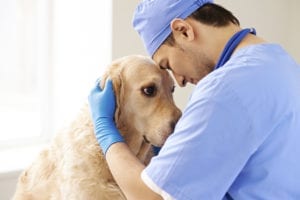 If the thought of responding to an emergency situation has you in a panic, you aren’t alone. Any emergency situation affecting a family member or loved one not only involves our quick thinking but it also involves our emotions. A medical emergency involving a beloved pet brings up similar responses.
If the thought of responding to an emergency situation has you in a panic, you aren’t alone. Any emergency situation affecting a family member or loved one not only involves our quick thinking but it also involves our emotions. A medical emergency involving a beloved pet brings up similar responses.
As with any emergency, preparedness is key to effective response. Emergency preparedness involves – first and foremost – knowing how to identify an emergency and then, what actions to take.
Is Your Pet Experiencing an Emergency?
While some situations are obvious emergencies, there are many dangerous and life threatening health emergencies that have minimal or subtle symptoms. For example, many pet owners have dealt with cat or dog vomiting. In most cases, it is as simple as a hair ball or an upset stomach due to the introduction of new food or motion sickness. But, vomiting – and particularly vomiting that does not subside with a few hours – can be a sign of a more serious illness or possible poisoning.
Here are some symptoms to be alert to:
It’s likely you will notice if your pet seems “off” somehow. Quick thinking pet parents have been known to catch a medical emergency in its early stages simply because they noticed a pet was behaving differently or out of the ordinary. It’s always a good idea to follow up on your intuition and get your pet in for a check-up.
There are other situations that should be viewed as emergencies, regardless of whether or not your pet is showing signs of distress. Take all of the following situations seriously and consider them pet emergencies.
In cases of internal bleeding or trauma, the symptoms are hard to detect until it’s too late. Please view all accidents, attacks, or trauma as medical emergencies.
How to Respond to a Pet Emergency
You have probably heard this before, but it is true that the first order of business in an emergency is to make sure you are out of harm’s way and to remain calm. By remaining calm, you will have better focus in attending to your sick or injured pet and will help him stay calmer while you are getting the help he needs.
With any veterinary emergency, the sooner you get your pet in for treatment, the better his chances of recovery. Contact us immediately, or the nearest veterinary emergency clinic. We recommend you keep both our number and the number of your neighborhood emergency animal hospital on your refrigerator, in your pet’s health records file, and saved in your phone.
Use a crate or a carrier lined some blankets to transport your pet. You may wish to bring your pet’s health records and any medication he or she is currently taking.
Pet emergencies can happen anywhere, at anytime. Ideally, it’s a good idea to have a pet first-aid kit in your car and duplicate medical records for travel. We previously mentioned that the American Red Cross has a fantastic pet first-aid app for your iPhone/Android that will walk you through a pet emergency, as well as provide pet first aid information and quizzes to keep you informed and prepared. We encourage you to download it.
If you have any questions about your pet’s health or are concerned about a symptom you’ve noticed, please phone us to schedule an appointment.
Recent Posts
About Us
We know that choosing the right veterinarian for your pet (and you) can be a challenge. Yet, with our stress-free handling, our long-term, experienced staff, and a state-of-the-art facility, we make the decision an easy one!
